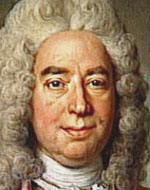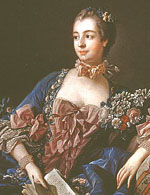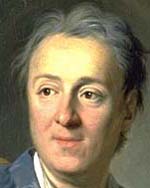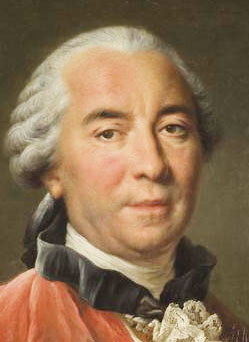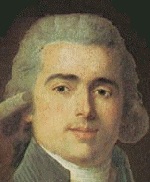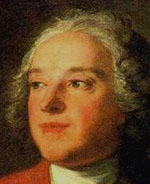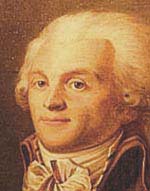Mots Français
Eighteenth CenturyDestouches (Philippe Néricault, 1680-1754)
Destouches was a dramatist and a member of the French Academy. This aphorism, from the play L'Obstacle Imprévu (1717), expresses the foremost rule of political life: show up for it.Les absents ont toujours tort
Those who are not there are always in the wrongCharles de Secondat, Baron de Montesquieu (1689-1755)
Montesquieu's great work, attempting to bring human society under the control of human reason, is De l'Esprit des Lois (1748). It shows the influence of Locke, and itself influenced the American Constitution. He was also a notable aphorist. Here is an aphorism from that work (XIX 14):Lorsque l'on veut changer les moeurs et les manières, il ne faut pas les changer par les lois.
When one wishes to change manners or customs, it should not be done by changing laws.Montesquieu's earlier Lettres Persanes (Persian Letters, 1721), with their device of cross-cultural perspective, had a wide circulation. In retrospect, they were part of the comparative perspective forming the background for De l'Esprit des Lois. Here is a sample from the earlier work:
Si les triangles faisaient un dieu, ils lui donneraient trois côtés (#59)
If the triangles were to make a god, they would give him three sidesMadame de Pompadour (Jeanne-Antoinette Poisson, 1721-1764)
There are all sorts of ways of preparing for the French Revolution. One is simply to foresee it. This (according to the Mémoires of Madame de Hausset) was said to Louis XV in 1757. It alludes to Noah's Flood, as a punishment for a wicked world:Après nous, le Déluge
After us, the FloodMadame de Pompadour did her best to amuse the King, at first her lover and in later years her friend, by staging theatrical entertainments for his amusement. She was also the possessor of a large library, and the patroness of Voltaire and of several artists; she sponsored architecture and created a style. Near the end of her life, in 1763, when she was 43, the visiting Mozart had this to say of her: "She is still a handsome woman . . . she is extremely haughty, and still rules over everything."
Denis Diderot (1713-1784)
The universal intellect and materialist presumptions of Diderot remain strong influences in French and indeed in European thought; he was in effect the stage manager for the French Enlightenment. It is not without reason that one of the Paris Universities (VII) is named for him. With D'Alembert's assistance, and with contributions from others (including Montesquieu, Voltaire, and Rousseau), he took over the stalled Encyclopédie project in 1754, The first of 28 volumes appeared in 1751 and the last, surreptitiously because of Jesuit opposition, in 1772 (a five-volume supplement and index were published in 1780). He also produced respectable amounts of art criticism, plays, fiction, and a gigantic personal correspondence. Much of his output was published posthumously. From his lifetime, we have the Pensées Philosophiques of 1746. Here are two samples:On doit exiger de moi que je cherche la vérité, mais non que le la trouve (#29)
One may demand of me that I should seek truth, but not that I should find itwhich possibly owes something to Montaigne. On the search for truth, he noted that nothing is established on the basis of authority alone:
Le scepticisme est donc le premier pas vers la vérité (#31)
Doubt is thus the first step toward truthThere, in a nutshell, is the essence of the scientific spirit. There is also something to be said for last steps:
Terre, terre!
Land! Land!This was written on 18 Aug 1765 to Sophie Volland, an expression of relief at the completed publication of the text (not yet the illustrations) of the Encyclopèdie. The task, in which Diderot had had the leading role, had occupied more than fifteen years.
As to shorter-term inspirations, Diderot in Paradox sur le Comédien put into an all too memorable phrase the moment when we think of just the right thing to say, after leaving the grand assembly:
L'esprit de l'escalier
Staircase inspirationMark Twain's variant of this remark is "Repartee is something we think of twenty-four hours too late."
Voltaire (François Marie Arouet, 1694-1778)
An early apostle of reason and dissent, disapproved of by monarchs and revered by others, Voltaire is one of the architects of the modern intellect. His bitter novel Candide (1759), written after the disillusionment of the Lisbon Earthquake, sought to refute the notion of divine providence. Many of Voitaire's best remembered lines are from his Dictionnaire Philosophique of 1764. This saying has worn particularly well (as well it might, being further polished from an earlier aphorism by somebody else). It accepts the practical solution in preference to a better but unattainable one:Le mieux est l'ennemi du bien
The better is the enemy of the good enoughJean-Jacques Rousseau (1712-1778)
Much of modern political theory owes a debt to Rousseau, who took a Mencian line on the question of human nature, leading him to fault society as having corrupted man. This line from Du Contrat Social (1762) expresses the anger that suffuses his outlook.L'homme est né libre, et partout il est dans les fers
Man was born free, but everywhere he is in chainsGeorges-Louis Leclerc, Comte de Buffon (1707-1788)
His mother liked to say that he got his brains from her. What he undeniably did get from her was her estate, Buffon, which he intherited at her death, and on which he pursued his researches unil the end of his life. The first of these, continuing an early interest in mathematics, were in the calculus of probability. He became interested in plant physiology, and in 1735 published a translation of Stephen Hales' Vegetable Staticks. In the preface to that translation, he developed his first conception of scientific method. Not forsaking mathematics, five years later he published a translation of Newton's Fluxions, in which he discussed the differences between Newton and Leibniz, the other inventor of the calculus. In the plant world, he had been investigating the properties of different kinds of timber, a matter of great importance to shipbuilding, which in turn was of great importance to France. In 1739 he was made Keeper of the Jardin du Roi, and of the museum connected with it. Assigned to catalogue the Royal collections in natural history, he instead produced a masterpiece, his Histoire naturelle, générale et particulière. From v2, we have this reflection on the methods of the scientist:Rassemblons des faits pour nous donner des idées.
Let us gather facts in order to give ourselves ideas.This was the first modern attempt to systematize knowledge in the fields of natural history, geology, and anthropology. In that sphere, he was the counterpart of his friend, the encyclopedist Diderot. Leclerc's first 15 volumes appeared over the years 1749-1767, and were immensely popular. In all, he was able to publish only 42 of the planned 50 volumes, the last 8 being completed from his notes by his friend, the Comte de Lacepede. Then there was his liteary side. Being made a member of the French Academy, on 25 August 1753, he delivered his Discourse on Style, containing this immortal remark. Which, as coming from a statistician, we may take as definitive:
Le style c'est l'homme même
The style is the man himselfAntoine de Rivarol (1753-1801)
This remark, from a treatise entitled Discours sur l'Universalité de la Langue Française (1784) captures what French stylists aim at. The desire for precision in words is a main thread of French literary consciousness, going back to Malherbe (1555-1628) and the French Academy (Académie Française, 1635) in the preceding century.Ce qui n'est pas clair n'est pas français
What is not clear is not FrenchRivarol died in Berlin. Something other than classic balance and clarity was about to happen in France.
Perrre Augustin Caron de Beaumarchais (1732-1799)
A watchmaker who became rich (and titled) through his own enterprise, Mozart's collaborator (by way of the librettist da Ponte) here contributes a notably subversive line to his play, Le Mariage de Figaro (Acte 1, Scène 1). The play was delayed by the Paris censor in 1781, and finally performed in 1784; Mozart's opera premiered in Vienna in 1786. It was a great success. When the aristocracy's pretensions are not only denied but ridiculed, the moment of change has arrived. Give or take three years.Prouver que j'ai raison serait accorder que je puis avoir tort
To prove that I am right would be to concede that I could be wrongAnonymous
Nobody knows where this phrase (originally ending in ou la mort "or death") came from, but it came to emblematize the French Revolution, which broke out in 1789, the first of several spasms which, over a century, finally modernized French finance and administration:Liberté! Égalité! Fraternité!
Liberty! Equality! Fraternity!Maximilien Robespierre (1758-1794)
Theorist, and finally victim, of the Revolutionary chaos, Robespierre dominated France as the leader of the Jacobin political group during the period of the Terror. On paper, the leading ideas sound cogent enough:Toute loi qui viole les droits imprescriptibles de l'homme, est essentiallement injuste et tyrannique; elle n'est point une loi
Any law which violates the inalienable rights of man is in its nature unjust and tyrannical; it is no law at all. . . but we suggest that you open your door cautiously in a state where Mencian political theories have acquired the police power.
25 Dec 2005 / Contact The Project / Exit to French Index Page
